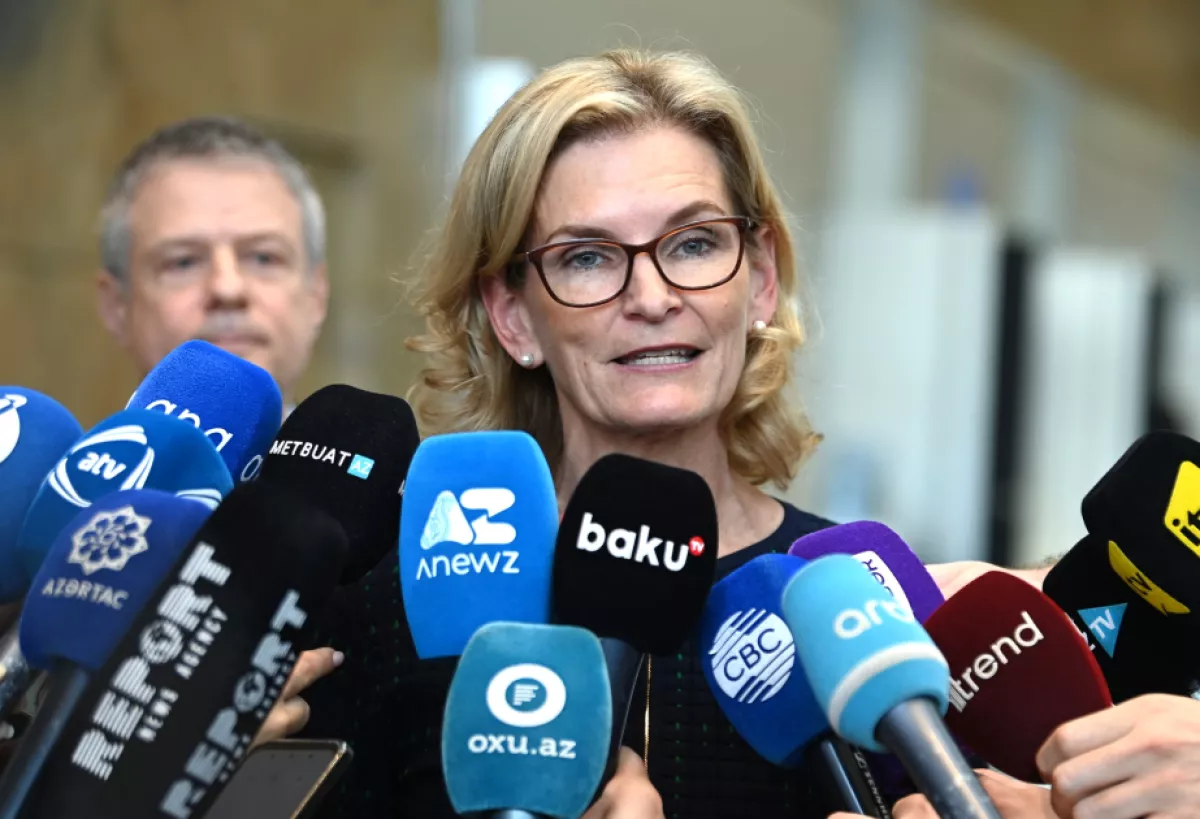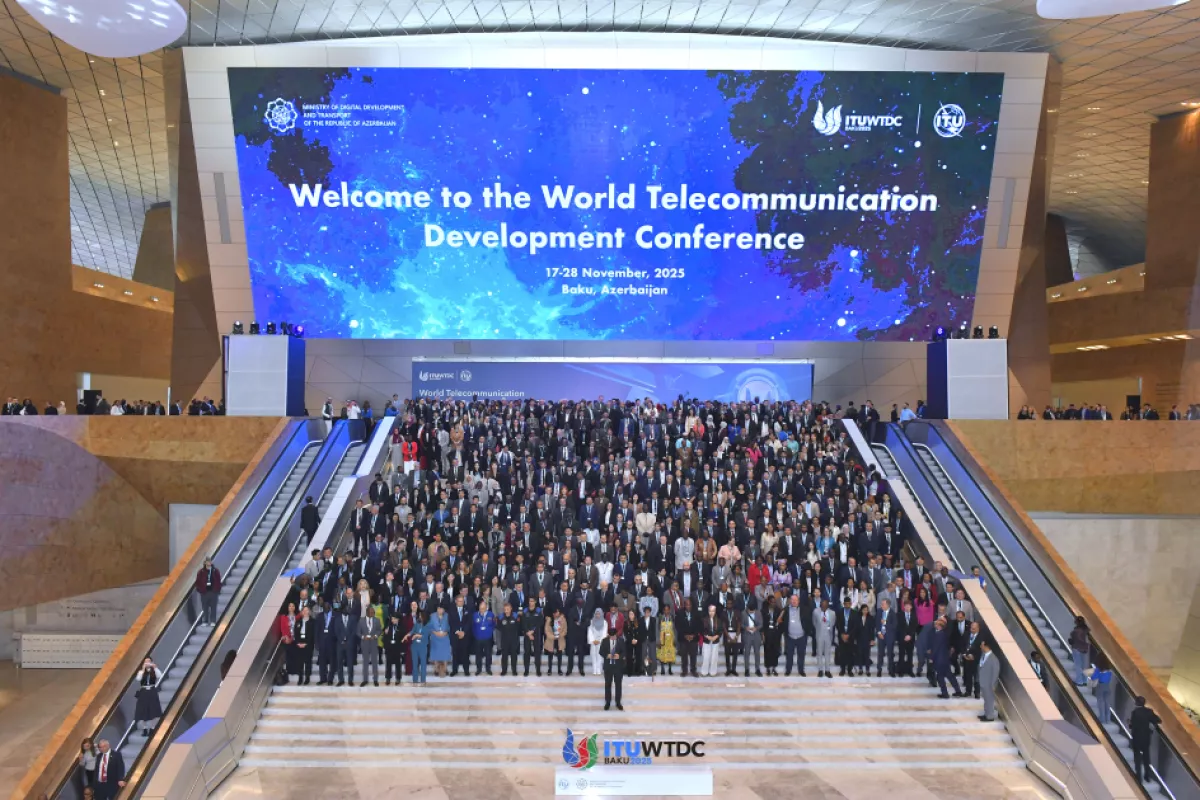WTDC-25: Baku leads efforts to bridge global digital divide Turning connectivity into opportunity
The past decade has seen remarkable progress in the development of information and communication technologies (ICT) in Azerbaijan. By establishing a space industry, advancing fourth-generation mobile technologies, and providing fixed broadband internet nationwide, the country has secured a leading position in the Eurasian region. These achievements have enabled Azerbaijan to fully align with the UN Sustainable Development Goals (SDGs) aimed at reducing the digital divide and promoting digital transformation.
The future of ICT development is now under discussion at the Baku Convention Centre, where the World Telecommunication Development Conference (WTDC-25) is being held from 17 to 28 November under the theme: “Universal, meaningful, and affordable connectivity for an inclusive and sustainable digital future.”
Organised jointly by the International Telecommunication Union (ITU) and Azerbaijan’s Ministry of Digital Development and Transport, the forum is held once every four years and aims to reduce the digital divide between countries worldwide and advance digital transformation. WTDC-25 brings together around 2,500 delegates from 150 countries, including approximately 60 ministers and deputy ministers, as well as over 300 youth representatives.
As an open international platform, the Baku forum will provide young professionals with the opportunity to explore global technological trends, engage with experts, and establish cooperation with leading international specialised organisations.
Speaking at the forum’s opening ceremony, ITU Secretary-General Doreen Bogdan-Martin noted: "The task of WTDC-25 participants is to use discussions and policy decisions to help meet people’s needs for digital connectivity and strengthen their resilience. The power of collective progress is most clearly demonstrated in the Partner2Connect Digital Coalition, which focuses on commitments, pledges, and resource mobilisation to overcome digital inequality. The coalition has brought together over 1,000 commitments and mobilised around $80 billion to support meaningful connectivity and sustainable digital transformation worldwide."

Notably, Azerbaijan has become the first country in the CIS region to host this ITU conference, creating a foundation for further strengthening the country’s role in the region in the fields of technology, science, and digitalisation, as well as enhancing the republic’s international standing. This is hardly surprising, given that the rapid development of Azerbaijan’s ICT sector is a well-documented reality, repeatedly confirmed by numerous reports from international rating agencies, as well as studies by the UN, the International Monetary Fund, the World Economic Forum (WEF), and, of course, the ITU.
ITU experts have long noted that Azerbaijan occupies a well-deserved position between highly developed and developing countries in terms of IT sector development. About a decade ago, the country was ranked among the ten most dynamically developing states globally achieving significant ICT results. At the same time, Azerbaijan joined the list of forty countries worldwide whose territories are fully covered by 3G–4G mobile technologies.
"The field of communication technologies has become the leading force of Azerbaijan’s non-oil economy, gaining a steady growth pace over the past four years. This has been accompanied by consistent measures to develop artificial intelligence, prevent cyberattacks, and expand digital infrastructure," stated President Ilham Aliyev in his address to the WTDC-25 participants.
In the address, read out by Azerbaijan’s Minister of Digital Development and Transport, Rashad Nabiyev, the head of state emphasised that today the country holds a leading position in the region in terms of full broadband internet coverage of the population and is also among the leading countries in the field of digital identity.
"The biometric digital signature system known as 'SIMA' has already been adopted by 3.6 million users and integrated into more than 80 public information systems. It is no coincidence that Azerbaijan has entered the highest category group of the UN E-Government Development Index. Our goal is to rank among the top 40 countries in this index within the next five years," stated President Ilham Aliyev.
The head of state also noted that, according to the document “Azerbaijan 2030: National Priorities for Socio-Economic Development”, the formation of a digital economy is defined as one of the main strategic directions for the country’s development. National priorities also include the implementation of the Information Security and Cybersecurity Strategy, which forms the foundation of Azerbaijan’s national security architecture, with particular emphasis on public–private sector cooperation in achieving these objectives.
"Baku, the host city of the World Telecommunication Development Conference, is not only a global telecommunications center, but also a hub for international digital cooperation today. An ITU Regional Acceleration Center is scheduled to be opened in Baku within the framework of the conference. The Center, which will be part of the ITU global innovation network, will become a leading platform for innovation and entrepreneurship in the region," President Aliyev said in his address to the conference participants.

The sustainable development of digitalisation, the creation of modern IT infrastructure, and the advancement of 5G and artificial intelligence (AI) technologies strongly distinguish Azerbaijan at both the regional and global levels, particularly against the backdrop of challenges faced by many developing countries.
"Three core values are important to us: people, independence, and prosperity. If technology does not serve the well-being of people, its essence is lost," said Cosmas Luckyson Zavazava, Director of the ITU Telecommunication Development Bureau, speaking at the conference. "The digital revolution is no longer a concept of the future—it is a reality shaping our present. However, the positive effects of this development have not yet reached all countries equally."
Recent statistics show that 2.2 billion people worldwide still do not have internet access. In low-income countries, only 23% of the population—and in some cases even fewer—have internet access. "While some countries are moving toward advanced technologies such as AI, others still face difficulties in providing universal broadband access," the ITU representative noted. He added that digital inequality is no longer merely a question of infrastructure access; it has become a complex issue involving digital skills, accessibility, relevant content, and cybersecurity.
"The goal of the ITU conference in Baku is precisely to reduce global digital inequality, expand access to affordable and high-quality connectivity, and enhance digital capabilities for the least developed countries, landlocked states, and small island nations," said Samaddin Asadov, Chair of WTDC-25 and Deputy Minister of Digital Development and Transport of Azerbaijan. He emphasised that Azerbaijan provides 100% broadband internet coverage across its entire territory, allowing the country to serve as a regional example and share its experience on the international stage.
"Azerbaijan is becoming a dynamically growing regional hub for digital development. The 'Digital Azerbaijan' strategy until 2030 drives IT transformation by investing in cloud services, intelligent infrastructure, and data centres that can support AI development," said ITU Secretary-General Doreen Bogdan-Martin. "For example, the 'Digital Silk Road' project, connecting Azerbaijan with Georgia and further to Europe through a new fibre-optic backbone network, is expected to further enhance international connectivity and strengthen the resilience of digital infrastructure."
In March 2025, Azerbaijan and Kazakhstan signed an agreement in Baku to commence work on the TransCaspian Fiber Optic (TCFO) submarine cable. "At present, the route analysis for the section of the Caspian Sea seabed where the cable will be laid has been completed. The company undertaking this work will soon present a report to the project operators and participants, and cable laying is expected to begin next summer, with the project scheduled for completion by the end of 2026," Deputy Minister Asadov stated on the sidelines of the conference.

Overall, the TCFO project, which holds strategic significance for the entire Caspian region, involves the construction of a 380 km submarine fibre-optic line connecting Sumgayit in Azerbaijan with Aktau in Kazakhstan. The new optical line will provide high-speed internet connectivity of around 400 terabits per second. The combination of high data transfer speed and minimal latency is one of the key commercial advantages of this efficient and relatively short route.
The achievements of the TransCaspian Fiber Optic project will be discussed in one of the forum sessions. It is also expected that the conference will adopt a roadmap for global digital development for 2026–2029 and outline new regional initiatives and priorities in the field of telecommunications.
WTDC-25 has received 184 initiatives from ITU member states, which will be discussed over the two-week conference in plenary sessions and committees before being submitted for approval. Topics to be addressed include cybersecurity, AI development and the promotion of its ethical use, as well as issues related to the convergence of mobile and satellite communications, among others.
At the conclusion of the conference, the Baku Declaration is expected to be adopted, defining the key priorities for ITU’s 194 member states. For the CIS countries, around five core priorities will be highlighted, and over the next four years, the International Telecommunication Union will aim to implement them.








